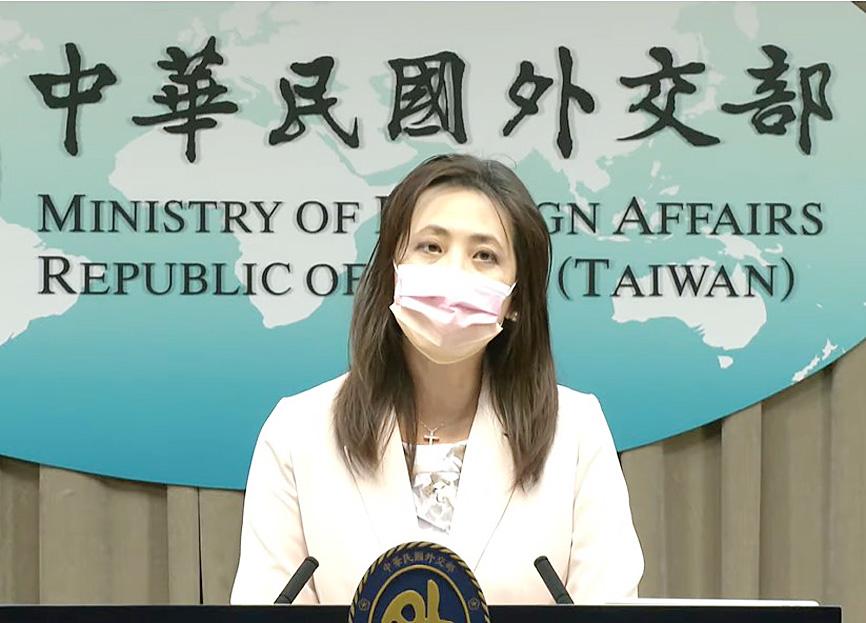Trade engagement with other countries is not subject to China’s approval, the Ministry of Foreign Affairs said yesterday after Beijing reportedly issued a warning to the UK over talks it conducted with Minister Without Portfolio John Deng (鄧振中), Taiwan’s top trade official.
In a report on Monday, US-based news organization Politico said in its European edition that Deng had met with his counterparts in London in the middle of last month to discuss bilateral trade and to learn from the UK’s experience in applying to join the Comprehensive and Progressive Agreement for Trans-Pacific Partnership (CPTPP).
Following the meeting, Beijing issued a warning to London, reiterating its stance that Taiwan is part of the People’s Republic of China’s (PRC) territory, Politico reported.

Photo: Lu Yi-hsuan, Taipei Times
Ministry spokeswoman Joanne Ou (歐江安) yesterday confirmed that Deng had met with British “economic and trade officials” during a visit to the UK last month.
Their discussions covered topics that included “the CPTPP and bilateral trade relations,” Ou said, adding that the ministry was pleased to see the two states enhancing their friendly relations, and their economic and trade ties.
Regarding China’s reported warning to the UK, Ou said that only the popularly elected government of Taiwan can represent its people in the international community and engage in trade talks with other entities.
Taiwan has never been part of the PRC, and neither side of the Taiwan Strait is subordinate to the other, Ou said.
“The PRC, therefore, has no right to interfere in Taiwan’s foreign relations,” she said.
The CPTPP, which grew out of the Trans-Pacific Partnership after the US left that pact in January 2017, is one of the world’s biggest trade blocs, representing a market of 500 million people and accounting for 13.5 percent of global trade.
Its 11 signatories are Australia, Brunei, Canada, Chile, Japan, Malaysia, Mexico, New Zealand, Peru, Singapore and Vietnam.
Taiwan on Sept. 22 last year applied to join the CPTPP — less than an a week after China submitted its application.

A group of Taiwanese-American and Tibetan-American students at Harvard University on Saturday disrupted Chinese Ambassador to the US Xie Feng’s (謝鋒) speech at the school, accusing him of being responsible for numerous human rights violations. Four students — two Taiwanese Americans and two from Tibet — held up banners inside a conference hall where Xie was delivering a speech at the opening ceremony of the Harvard Kennedy School China Conference 2024. In a video clip provided by the Coalition of Students Resisting the CCP (Chinese Communist Party), Taiwanese-American Cosette Wu (吳亭樺) and Tibetan-American Tsering Yangchen are seen holding banners that together read:

UNAWARE: Many people sit for long hours every day and eat unhealthy foods, putting them at greater risk of developing one of the ‘three highs,’ an expert said More than 30 percent of adults aged 40 or older who underwent a government-funded health exam were unaware they had at least one of the “three highs” — high blood pressure, high blood lipids or high blood sugar, the Health Promotion Administration (HPA) said yesterday. Among adults aged 40 or older who said they did not have any of the “three highs” before taking the health exam, more than 30 percent were found to have at least one of them, Adult Preventive Health Examination Service data from 2022 showed. People with long-term medical conditions such as hypertension or diabetes usually do not

POLICE INVESTIGATING: A man said he quit his job as a nurse at Taipei Tzu Chi Hospital as he had been ‘disgusted’ by the behavior of his colleagues A man yesterday morning wrote online that he had witnessed nurses taking photographs and touching anesthetized patients inappropriately in Taipei Tzu Chi Hospital’s operating theaters. The man surnamed Huang (黃) wrote on the Professional Technology Temple bulletin board that during his six-month stint as a nurse at the hospital, he had seen nurses taking pictures of patients, including of their private parts, after they were anesthetized. Some nurses had also touched patients inappropriately and children were among those photographed, he said. Huang said this “disgusted” him “so much” that “he felt the need to reveal these unethical acts in the operating theater

Heat advisories were in effect for nine administrative regions yesterday afternoon as warm southwesterly winds pushed temperatures above 38°C in parts of southern Taiwan, the Central Weather Administration (CWA) said. As of 3:30pm yesterday, Tainan’s Yujing District (玉井) had recorded the day’s highest temperature of 39.7°C, though the measurement will not be included in Taiwan’s official heat records since Yujing is an automatic rather than manually operated weather station, the CWA said. Highs recorded in other areas were 38.7°C in Kaohsiung’s Neimen District (內門), 38.2°C in Chiayi City and 38.1°C in Pingtung’s Sandimen Township (三地門), CWA data showed. The spell of scorching